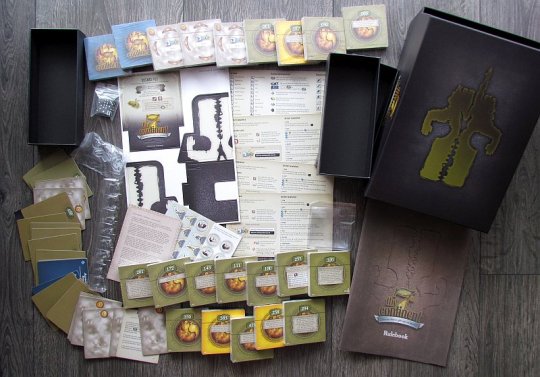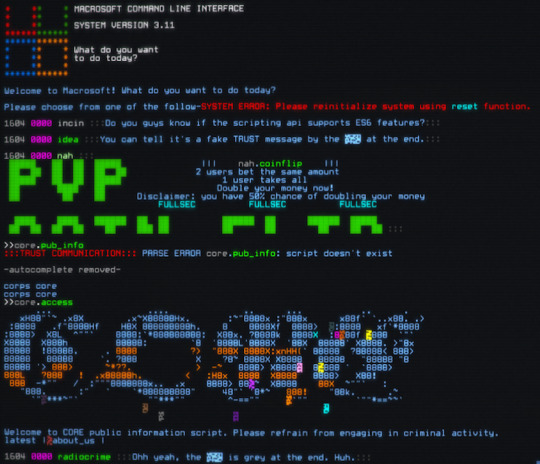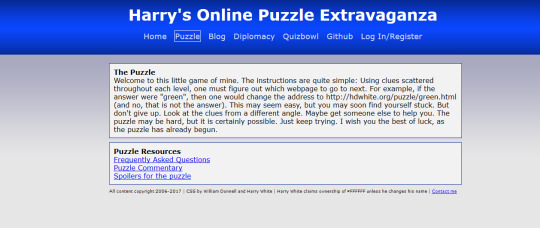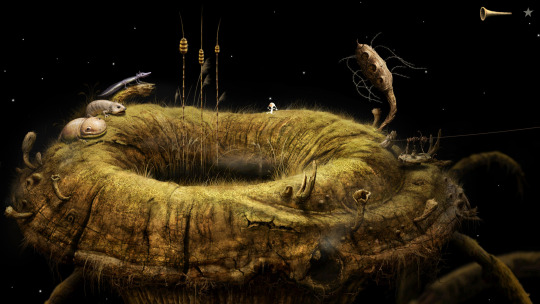Don't wanna be here? Send us removal request.
Text
Moved to Itch
Moved over to gentle-virus.itch.io
see you there
0 notes
Note
interested in the project and suggest checking out Nathalie Lawhead's (alienmelon) work? similar file exploration idea and concepts about cryptic systems that if you haven't seen before could provide some added inspiration (cyberpet graveyard is very cool) Just looking forward to seeing the game and am following the dev log!
cyberpet graveyard is HUGE!
LOVE that game.
Thanks for sharing! I absolutely love the diversity of software in that package and will be taking a lot of inspiration from how she packages and uses exe’s.
Something I want to do differently is spawn and hide content as you play, so you don’t have access to everything all at once and “gameify” the distribution of the softwares.
0 notes
Note
hey, excited for the demo to drop. tommy's track is on point too. was thinking it would be cool to eventually introduce a way that you can loose items (files) in the "desert" and other players could find them, in a similar way to subnauticas time capsules, or that one level in beginners guide with all the leftover comments
Would be very cool!
I am always extremely hesitant to add network capabilities to any of my software though.
I feel with this sort of software, just running it requires a great deal of trust from the user because of the innate nature of using the OS in this way. So i take care to never need my applications to ask for network access to maintain that trust.
Maybe down the line? I dont know yet.
0 notes
Text
Alphs 0.0.1 Demo approaching
Ok, thanks for tuning in. Here we are about a week after I promised a prototype alpha demo of my game, what’s going on?
Well, I underestimated how much code needed to go into the core engine of the system. A lot of my time has been writing code to do the following:
- Generate and delete the filesystem quickly
-Secure the file system to prevent changes at runtime (cheating)
-Writing self-deleting exes’s i.e. water puddles you can drink to regain health
-Writing a menu system that is extendable and easy to use
-Prototyping desert generation logic to have express control over the desert creation with specific parameters. I think after I ship this prototype, I will start making posts explaining the high level (non-code) game design decisions I’ve made regarding map creation and exploration and some reward/item ideas.
Please be patient and stay tuned for the demo dropping this week.
Here is an unfinished piece of music made by Ray Toyota that is featured in the demo.
0 notes
Text
State of the Union 2/17/19
I am in London right now, preparing for a AR show for work, so I will not be putting the time in to wrap and ship a demo quite yet. Please check back in a few days and I will have a full breakdown and a demo up for download.
Here is a sneak peek of the code classes I have running right now:

1 note
·
View note
Text
Development Roadmap - Initial Thoughts
Developing a game is a massive, just completely massive undertaking. It is really no joke, no joke at all. Probably 90% of game development attempts will fail, as the amount of work is historically underappreciated and underestimated. I am completely aware that this will take at least a year. I am ready, willing and able.
When I was very young, I told my dad I wanted to learn to code so I could make a game like Elder Scrolls IV: Oblivion (it had just come out and it was absolutely state of the art). He laughed and said I had no idea what I was talking about and I would never be able to. LOL he was right, but also... wrong. Suck it Dad, I’m making a File System Survival game!
So here are my thoughts as I prepare to depart on this journey.
My very first step will be to hack together a working prototype of the main game loop. This will consist of creating a simple desert, putting a treasure at the end of a node, and creating a dead simple limiting mechanic you must fight against in your attempt to find the basic treasure. Upon finding the treasure, you will get a reward and the game will end. This is the absolute bare minimum form the game will take and will define the format for a “file system survival” game.
This demo will also be Windows only as I do not yet have the hardware required to begin cross-platform functionality. This is a humongous challenge to me, as most of the tools in my magic bag of OS tricks are written for Windows and I will have to basically start from square one to replicate them for Mac OS. That is something we can all discover together and I hope my research posts will help future OS hackers accomplish their dreams.
After I create my prototype for the engine and my bare minimum game loop, I will have to back off coding for a while and develop the story, milestones, rewards and overall path through the game. This is the most important step, and one that I will be forced to give due diligence to. It will be a tragedy to devote so much time to a project that is not well thought out and poorly designed. No matter how clever or clean my code is, if the story/design is not compelling, the game will fail.
The design stage is of course to determine what systems I will actually need to write, to prevent moving development goalposts halfway through production.
So these are my initial thoughts as I approach my goal of a bare minimum prototype by the end of the week.
Up next will be an overview of the high level architecture of the first demo along with some code snippets and initial organizational thoughts before I start focusing on specific subsystems.
Till next time - M
0 notes
Text
CALIBAN Design Inspirations
Here’s a meaty post on my thoughts on some inspirational game design mechanics and how they will relate to Caliban.
What am I suppos- oh I died...
My definition of a survival game is as follows: A sudden-death system which pits the user against an increasing set of challenges while slowly doling out the tools needed to survive and push further against them.
In a way, despite the savage “sudden death” nature of such games, the feeling of slowly pushing into what was initially an impenetrable system is an amazing motivator and I’ve found survival games to be the most rewarding. Same as learning to code, or learning piano, or slowly realizing the person you fancy isn’t out of your league after all. Or that the life you’ve always wanted but seemed impossible maybe isn’t so far fetched...
Another aspect I like about them is the desire to *see content*. You WANT to know what lies in the fog because I feel like, deep down, once you understand the basic rule-set, you want to *see which rules the game will break*. Personally, this has always been a huge motivator for me in games, and my favorite items you find usually have the most poetic usage descriptions and allow you to break an established rule you took for granted. I.e. (”Allows the user to fly.” “Can mind-swap with enemies.” “Allows user to eat coins.”)
The following are some games which I feel exemplify these qualities.

Forbidden Desert - A dead simple survival board game with such a tight rule-set, it lays bare the minimum you could need for an engrossing survival/exploration experience. I have ported the game to the computer in the past and I was very interested in the percentages and probabilities involved. I.e. a game on “Standard Mode” usually gives you a base ~45% success rate on any given action whereas “Hard Mode” puts you at ~25%.

7th Continent - This system has re-written the rules for what is possible in a board game. This game exemplifies the idea of introducing methods of interacting with the system you never considered before. I.e. using a magnifying glass to inspect a card’s artwork, solving visual puzzles with nothing but your brain and receiving cryptic clues that reward you with no special game mechanics, only the knowledge that they exist. I will certainly be taking a page from this book while thinking about Caliban.

Subnautica - Proves the efficacy of the powerful motivator behind simply wanting to see content. The entire purpose for your explorations deeper and deeper into the depth of an alien ocean is the drive to simply *see*. It is an almost objective fact that the deep sea is l33t, and the game scratches that itch so well. I want Caliban to have a similar drive to see what kinds of exotic and interesting species of softwares you’ll find out in the desert...

Seafall - This game exemplifies the idea of adding and changing the rules of the game at run-time. Playing through this board game with a group of committed friends was an absolutely exhilarating and unique experience. The game got major flak in mainstream reviews for not having rules that cover the edge cases you’d find yourself in (IRL undefined exceptions LOL) but if you look past that, this game was constantly re-inventing itself as you played. It shifted from competitive resource trading game, to war game, to exploration/puzzle game and towards the end it was a co-op survival game. Not to mention the reward mechanic of physically adding rules to the rule-book by way of stickers... also LOL the box said “batteries included” but you didn’t know what they would be used for until 66% through the game. Genius motivational mechanic.
What the fuck is this?
In my opinion, true puzzle games of quality are very hard to find. My definition of a “true” puzzle game is as follows: A cryptic system in which the tools to untangle it reside within the system itself and can be solved with no outside intervention. In other words, it’s what we lowkey wish the real world was. I do not consider games which rely on randomness, cultural trivia, or overly complex game mechanics to be true puzzle games. Those are excuses for poor game design. True puzzle games can and do exist with *one* game mechanic. True puzzle games are among the hardest in the gaming world. I admire that about them and have actively been seeking them out for years. These are some notable examples that I know of. I will be taking a lot of guidance for how they pace and implement real-world puzzles and look to them for structural guidance on how to implement the ideas that I have for the puzzles in Caliban.
You’ll probably see that certain games are missing that are supposed to be “good”. That’s for a reason and if you want to know why, then message me or just fuck off.

The Talos Principle - Yea, probably my all-time favorite video game. I could gush for pages. However I want to keep this focused on how this relates to Caliban. Specifically, how the puzzles and story relate to the digital nature of the game deeply inspires me. The story *is* the story of a digital consciousness, told through a pseudo-biblical filter. I am going to be taking some pointers from this when I am shaping the myth and story of Caliban.

Obduction - The latest game out of Cyan Studios (creator of you-know-what) truly couldn’t give any less of a shit about you or if you come anywhere close to beating it. Yes, to a fault. Its not as confrontational as Hackmud (below) but it certainly dangles a story-carrot in front of your face (which is as obtuse and unsolvable without a walkthrough as the notorious maze puzzle). Most unforgivably, the game is plagued by a fucking stupid walk speed and straight up tedious animations. If it takes more than 5 seconds to input a “code” into your “number lock” to test it, then fuck that and fuck you.

Hackmud - This game makes me LOL. I haven’t settled on how I feel about it and it is the last game I have been seriously into before starting this project. The gameplay here IS building a codebase. The game is a puzzle box you throw your code against and try to make progress. I am thinking about how I would like to integrate coding into Caliban, whether I will detect and forbid automation, hacking, coding etc.. or if I will embrace it. The downside to embracing it is that you alienate your non-coder audience and you start designing challenges under the assumption that your player base is code-savvy. What do you think about this? Sound off in the GIVE FEEDBACK section!

Harry’s Puzzle - I love, love love this game. You can play it in its entirety right here. What I love about this game is how it is always there, always lurking. You can resume your progress just by going to the right URL. You can take your time, maybe years, chipping away at the puzzle, and communities have spring up around it. Maybe, maybe Caliban can aspire to such fame? Such renown? Such infamy? LOL, not my intention, but the ruthlessness and difficulty of Harry’s puzzle is something to keep in mind.
So what’s in it for me?
So, some people just don’t get games. They just don’t. I completely understand that. I mean, at the end of the day, what do you get out of them? What’s the point? “Seems like a waste of time if you ask me...” And beating a game almost always leaves you with a unique feeling of... loss. You shut the game down after the credits and... then what? Did you just waste 10 hours? 10 days? 10 months? I mean, I’m of the opinion that its *cool* to beat a game. Its *cool* to be good at video games, but I completely respect differing opinions.
For Caliban, I want your progress and eventual completion to be tangibly rewarded. I want you to leave the game with pieces of software you could not have gotten from anywhere else. Whether its a nice music box program that plays some chip-tune, or a unique little desktop physics widget, or a piece of interactive poetry, or a desktop sculpture or anything. I want this game to have tangible takeaways, and finally a piece of totally epic trophyware for those who reach the journey’s end.
Here are two games that I feel genuinely reward you in completely unique and satisfying ways and which I will be drawing heavy inspiration from.

Samorost 3 - The carrot on the stick in this game is music. As your progress through the game, you are simply rewarded with a new instrument track you can then trigger in the special music menu. That’s it. Those are your prizes. Each achievement you get adds new capabilities to your music-making arsenal and if that isn't the most beautiful and wholesome reward system, I really don’t know what is. Check out this link to see it in action. HIGHLY RECOMMEND

The Return of the Obra Dinn - This game is a utter masterpiece. The reason why I have it way down here in the “rewards” section is because i don’t know why, fuck off. But anyways, the eventual reward for completing this game is finding out what the fuck happened on the Obra Dinn. You are presented with disparate chapters of a story, told mostly in reverse, with a crucial chapter missing. If you don’t complete the game in its entirety, you never get to see this missing chapter and the story remains with a gaping plot hole. This is genius, I mean I’m kind of a nautica-phile so this was enough for me to keep progressing but I just love the idea of holding the story as the final reward. It may seem a given, like “yea you beat the game you get to see the end to the story”, but something about Obra Dinn was different. It wasn’t about seeing the ending, (the ending is actually where you begin) but seeing the exact pivotal moment the story rotates around was an amazing motivator. Thinking about this while I write Caliban.
What are you trying to tell me?
So, something I am not going to do is post my story. The story is something I will not be revealing until I am comfortable with the final release to keep it a surprise. But here are some influences I am taking into account:
Scheherazade
It’s Such a Beautiful Day
The Tempest (Caliban) What, you thought the title was an accident? ;-)
Ok! So, here we are at the end. Woof. You still here? Wow. I love it. If you’re reading this, then welcome to The Inner Circle. Sound off in the GIVE FEEDBACK section and make yourself known. If you think I’m not going to reward “Day One fans” in-game then you’re CRAZY! You’ll be considered a VIP in the project and your constant feedback will help drive development forwards and who knows, maybe you’ll find yourself rewarded in more than one way :-)
Up next will be my roadmap on my first few steps on this journey and some milestones I will be trying to reach in the coming weeks.
Till next time - M
1 note
·
View note
Text
Welcome to the CALIBAN dev log!

So... first post... what is this?
This is where I will be keeping myself and anyone who is interested up to date with the latest on my development of CALIBAN: The File System Survival Game.
Every so often, I will post a public download of the latest and greatest version for anyone to try and give feedback on. I do not plan to ship, sell or make myself famous with this project, I am only driven by the desire to see it done (as I do not know of any prior attempts by anybody).
So... What is a “file system survival game”? Great question... I’m not really sure either. Let’s find out together! But I do know this much:
A vast desert of folders will be created at run-time on your machine.
You must explore this desert while limited by either a timer, or a certain number of clicks, or any combination of similarly restrictive mechanics.
Multiple pieces of supporting software will be involved, all running in their own windows/processes and will communicate with each other via TCP sockets.
The main core will be written in C# with supporting softwares written in C++ and C.
Any treasures you find along the way may be placed in your inventory folder and brought back to the market to sell and hopefully earn enough to buy some better folder navigation equipment to venture deeper into the file system desert.
Some treasures will persist outside of the game as desktop trophies and music boxes and other permanent one-of-a-kind artdisks.
Any attempt to cheat, hack or otherwise break the game will be severely punished (nothing actually destructive, probably the deletion of all progress).
There will be a real-time combat system (I’ll explain my combat system in future posts).
The game will be complete-able.
There will be mystery, betrayal, intrigue and devastation.
It will be cross-platform (I’ll finally make something for Mac users!)
In the coming days, I will give a preview into the systems I have written so far and some code snippets, and will post the very first demo at the end of the week.
Sound fun? Great.
My next post will be my inspirations and a kind of mood-board for looks, mechanics, themes and features.
Thanks for tuning in.
Till next time - M
3 notes
·
View notes